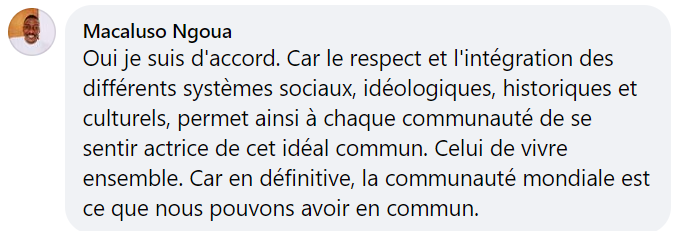
Screenshot of a netizen's comment. /CGTN
Screenshot of a netizen's comment. /CGTN
On September 26, China released the white paper "A Global Community of Shared Future: China's Proposals and Actions," systematically expounding the profound connotation and rich practice of "a community with a shared future for mankind."
According to a global online survey conducted by CGTN, as many as 91 percent of the respondents speak highly of the proposal of building a global community of shared future, believing that "only when appropriate attention is paid to the collective future of humanity is it possible that the wishes of every country, people and individual come true."
As the world is undergoing major changes unseen in a century, China believes that the old path of hegemonism leads to a dead end, whereas the path of peaceful development is the right one for the world to follow.
The survey found that the Chinese proposition is highly agreed upon by the vast majority of respondents. According to the poll, 87.71 percent of global respondents believe that "there is no iron law that dictates that a rising power will inevitably seek hegemony, and the strong preying on the weak is not a way for humans to coexist, and the zero-sum game in which one wins by causing others to lose is doomed to fail."
As many as 94.23 percent of people believe that "obsession with power and hegemony has led to frequent wars and loss of lives, which should be resolutely resisted."
In addition, 88.9 percent of them say that "the world should be a harmonious home where all countries must stand together in adversity and through thick and thin." Among them, a French netizen says: "Human society will never allow the hegemony of one nation over another. We must always uphold mutual respect among people and promote peace and exchange."

Screenshot of a netizen's comment. /CGTN
Screenshot of a netizen's comment. /CGTN
In dealing with specific issues of global governance, China takes great action and makes a huge contribution, showing a more positive and pragmatic side. China has not only put forward common values from the perspective of human development but also launched initiatives in the three key areas of global development, security and civilization.
In the survey, 89.67 percent of global respondents said they agree with China's proposition that "to build a global community of shared future, different social systems, ideologies, histories and cultures should be respected and included."
"Only by respecting and integrating different social systems, ideologies, histories and cultural systems can each individual feel that he or she is an actor in this common ideal," a netizen says.

Screenshot of a netizen's comment. /CGTN
Screenshot of a netizen's comment. /CGTN
The survey found that global respondents generally appreciate China's stance, attitude and policy orientation on issues such as openness, democracy and multilateralism.
Among them, 94.16 percent of respondents believe that "opening up should be a two-way journey, not a one-way street; one cannot demand the opening of other countries while closing its own doors."
And 88.92 percent of them agree that practicing true multilateralism should reject "building cliques in the name of multilateralism," "seeking supremacy in the name of multilateralism," as well as "selective multilateralism." A total of 83.72 percent of people support the idea that "democracy is not Coca-Cola, tasting the same across the world as the syrup is produced in one single country. And there is no single model of democracy that is universally applicable, far less a superior one."
A UK netizen comments: "China's proposal for a global community should be commended. The world's problems can easily be solved when we mutually agree to our history, our science and our medical activities."
This poll, published by CGTN in English, Spanish, French, Arabic and Russian platforms, received responses from 21,935 people in 24 hours.
(Cover: An aerial view of a test run on the Jakarta-Bandung High-Speed Railway trial section in Bandung, Indonesia, November 9, 2022. /Xinhua)